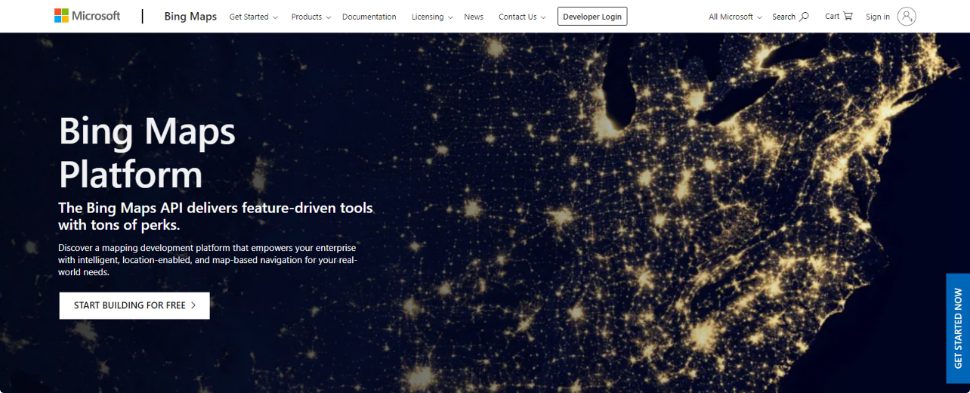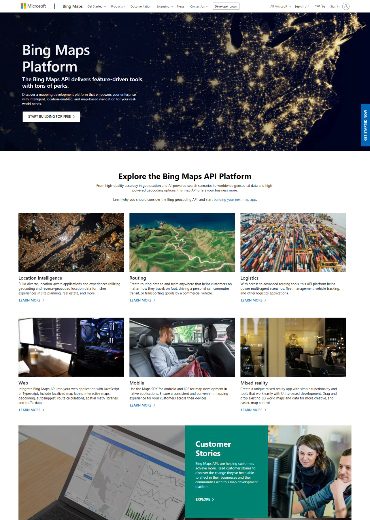-
URL : https://www.microsoft.com/en-us/maps
-
Business Type : Business to Business
-
Focus : Lead Generation
-
Client Industry : Internet & Telecommunications, Software
-
Platform : WordPress
-
Services Provided : PPC, SEO
Overview
The Bing Maps Platform by Microsoft allows enterprise-level developers to build map-based geospatial experiences using the Bing Maps API. On this platform, custom or standard data points can be added to provide users with specific geocoding features for millions of addresses in the United States. The Microsoft Bing Enterprise Maps team approached Coalition to boost their monthly leads through Enterprise Search Engine Optimization (SEO) and Pay Per Click (PPC) efforts, and to reverse the decrease in organic traffic to their website attributable to changes made in 2019.

See how our team’s efforts corrected the website issues, and grew the brand’s targeted goal completion by more than 11.56% or 35,208 leads within the first eight (8) months of our marketing campaigns.
Problem
Bing Maps Platform is a geospatial mapping platform produced by Microsoft. On this platform developers are able to create location applications and convert addresses into location maps of geographical coordinates. Often used by large scale delivery operations and shipping network clients such as Fulfillment by Amazon and Domino’s Pizza, this platform has a myriad of uses. Bing Maps can also be incorporated into brand’s marketing strategies. It provides data for routes and locations to drivers, vehicles, and their systems.
The Microsoft Bing Maps for Enterprise competes with other providers for enterprise mapping data and API support. In 2019, some changes were made to the website, which the team later realized led to a drop in organic leads. The brand’s leadership considered closing the Microsoft Bing Maps for Enterprise unit, and terminating all related marketing campaigns. However, they later decided to revamp the Maps unit and sought our team of experts to implement effective SEO and PPC strategies that would not only reverse these drops, but to surpass its pre-2019 leads levels.
Our team started with conducting comprehensive SEO Technical and PPC audits and analyzing the brand’s existing strategies and key performance indicators (KPIs). To help Microsoft return to its earlier position in enterprise mapping data and API support, our team developed a results-oriented marketing strategy that will attract new leads to the platform. Truly qualified new leads for licensing the Bing Maps API required extremely niche keyword targeting and technically-intensive supporting content.
Solution
We conducted thorough keyword research to identify the most valuable terms searched by qualified leads. We also rewrote and expanded the Bing Maps for Enterprise API section of Microsoft.com with SEO-optimized content, including information for location intelligence, routing, and logistics. We began a targeted pay-per-click campaign and implemented conversion rate optimization updates as well.
Search Engine Optimizations
There were several issues detected in the SEO technical audit. Our team addressed all on-page element issues including fixing all title tags, meta descriptions, header, image size, and alt text issues. Our efforts then turned to fixing technical issues including redirect chains, pages returning server errors, and redirect errors. Once all the findings of the SEO audit were addressed, we proceeded to optimize the brand’s website pages with keywords and relevant content. Primary, secondary, and tertiary keywords were added to several of the website’s pages that lost traffic due to the previous changes made to the website.
Throughout the first 8 months of the campaign, our team created copy for 46 site pages and 49 informative blog posts.


Paid Campaigns
Our paid search team conducted an audit of Bing Maps as well as its competitors. Custom intent audiences were built based on factors including keywords, demographics, geo-targeting and apps used by potential users. We launched a targeted pay-per-click campaign and implemented conversion rate optimization updates designed to enhance every step of the conversion process, from the PPC advertisements to the enhancement of the landing page user experience.
Paid campaigns including branded, non-branded, dynamic search, competitor search, intent based search, remarketing and smart ads were designed and launched. Additionally, several display and video ad campaigns were launched for Bing Maps.
Website Enhancement
Our team recommended several changes be done to the homepage. Footer links were updated with Bing Maps services as opposed to showing non-related map content. Our team corrected all of the “neglected” website pages that were impacted by the earlier updates made to the website and later optimized them. Optimized copy was posted on all of these pages and later added to the website navigation.

Results
Since the start of our partnership, the website has seen increases in new users, overall users, sessions, and goal completions. For the period February 2022 to the end of September 2022, organic search has contributed to more than 27% of site traffic. Paid search has also contributed to over 2.7% of all website traffic.
At the 8-month mark of our digital marketing campaign, our targeted URLs on Microsoft.com/en-us/maps were ranking for 492 new keywords, including valuable terms such as “Map API,” “Map License,” and “Truck Routing Software” on the first page of Google search results. Overall goal conversion rate from February 2022 to September 2022 was 11.56%, while the organic search goal conversion rate was 18.88% within this same time period. Total sessions within this 8 month period were 456,109. Bounce rate also decreased over the 8-month period.
27%
Site Traffic
Increase at the end of September 2022
11.56%
Overall Goal Conversion Rate
Increase at the end of September 2022
18.88%
Organic Search
Goal conversion rate
Increases were also seen in average session duration as well as conversion rate. This could be an indication of users finding the information they’re seeking more easily, and converting from these pages.